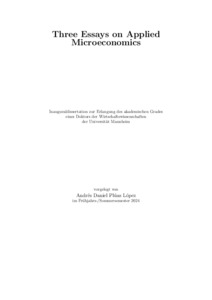|
Three Essays on Applied Microeconomics
Pluas Lopez, Andres Daniel
![[img]](https://madoc.bib.uni-mannheim.de/67479/1.hassmallThumbnailVersion/Dissertation_AndresDanielPluasLopez.pdf)  Vorschau |
|
PDF
Dissertation_AndresDanielPluasLopez.pdf
- Veröffentlichte Version
Download (9MB)
|
|
URN:
|
urn:nbn:de:bsz:180-madoc-674792
|
|
Dokumenttyp:
|
Dissertation
|
|
Erscheinungsjahr:
|
2024
|
|
Ort der Veröffentlichung:
|
Mannheim
|
|
Hochschule:
|
Universität Mannheim
|
|
Gutachter:
|
Sovinsky, Michelle
|
|
Datum der mündl. Prüfung:
|
15 Juli 2024
|
|
Sprache der Veröffentlichung:
|
Englisch
|
|
Einrichtung:
|
Fakultät für Rechtswissenschaft und Volkswirtschaftslehre > Empirische Industrieökonomik, Angewandte Gesundheitsökonomik (Sovinsky 2015-)
|
|
Lizenz:
|
 Creative Commons Namensnennung 4.0 International (CC BY 4.0)
Creative Commons Namensnennung 4.0 International (CC BY 4.0)
|
|
Fachgebiet:
|
330 Wirtschaft
|
|
Freie Schlagwörter (Englisch):
|
marijuana demand , marijuana legalization , illicit markets , statutory audits , bunching
|
|
Abstract:
|
This dissertation contains three chapters in the field of applied microeconomics. Specifically, they address research questions about the demand for (il)legal marijuana and firms' responses to financial audits.
In the first chapter, I assess the effect of recreational marijuana legalization on the black market's presence by studying Uruguay's marijuana market. This country's legalization aimed to reduce the drug trafficking market's presence and societal costs. However, post-legalization, a third of Uruguayan marijuana users still buy from drug dealers. In this chapter, I estimate a novel demand model in a post-legalized environment that includes access selection/limitations, alternative choices regarding the source (legal or drug trafficking), and individual-level prices. I use these estimates to identify tools that steer the demand to the legal market. Counterfactuals show that a 10% price reduction increases legal marijuana use by 9%, but primarily driven by new users. Reducing access to the drug trafficking market decreases the use of both legal and illegal marijuana, emphasizing access's role in demand. In contrast, widespread legal marijuana access leads to a 17% increase in legal use, with half coming from the drug trafficking market. Understanding consumer substitutions between (il)legal options is crucial for policies targeting black market reduction.
I the second chapter, joint with Tania Guerra Rosero, we analyze if the government should harness private agents to deliver public services. We assess this in the context of the tax administration in Ecuador where the government collaborates with third-party auditors to increase tax compliance. Large firms in Ecuador are required to have third-party audits of their yearly balance sheets and income statements. Auditors review the financial statements and prepare a tax compliance report for the Ecuadorian Tax Agency. We exploit a reform that significantly reduced the asset threshold determining the audit obligation and first document a large bunching response. Second, we provide suggestive evidence that bunching firms reduce their assets through reductions in the debts of their clients (accounts receivable) and in the short-term debts with their suppliers (accounts payable). Third, we use a donut-hole Regression Discontinuity Design to explore the effects of the audits on the audited firms. Our results indicate that firms reduce their reported costs and expenses by 24% and compensate for this with a reduction in reported revenues of 23%. Firms also reduce their net income by 32%. This suggests that governments should not rely on private agents to conduct tax audits.
In the third chapter, I assess the price elasticities of different forms of marijuana (inhalants and edibles) and how these elasticities vary based on potency preference. Using individual-level data from surveys conducted between 2020 and 2022 in Canada, I estimate a two-level nested logit model where individuals first decide whether to use marijuana and then select the form (edible or inhalant). The results indicate a positive correlation between marijuana forms' valuations and reveal that individuals with a preference for high THC potency obtain a lower utility for edibles over inhalants. Additionally, the study finds that edibles exhibit larger own-price elasticities, in absolute terms, compared to inhalants. Regarding inhalants, individuals with a preference for high THC potency are less price sensitive than individual without this taste. These findings can be useful for public policy when designing pricing strategies in curbing excessive consumption of more potent and harmful marijuana products.
|
 | Dieser Eintrag ist Teil der Universitätsbibliographie. |
 | Das Dokument wird vom Publikationsserver der Universitätsbibliothek Mannheim bereitgestellt. |
 Suche Autoren in Suche Autoren in
Sie haben einen Fehler gefunden? Teilen Sie uns Ihren Korrekturwunsch bitte hier mit: E-Mail
Actions (login required)
 |
Eintrag anzeigen |
|
|
